
Soras is one of 11 districts of the Sucre Province in the Ayacucho region in Peru.
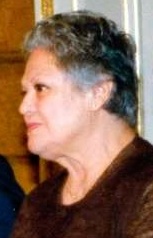
Manuela Ruiz Penella,better known as Emma Penella,was a Spanish film and television actress.
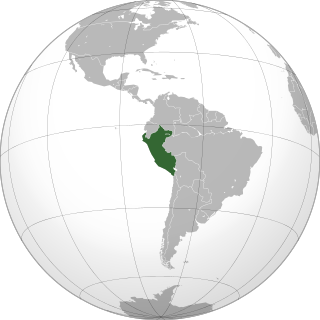
Lesbian,gay,bisexual,and transgender (LGBT) people in Peru face some legal challenges not experienced by non-LGBT residents. Same-sex sexual activity among consenting adults is legal. However,households headed by same-sex couples are not eligible for the same legal protections available to opposite-sex couples.

Magaly Solier Romero is a Peruvian actress and singer.

Susana Chávez Castillo was a Mexican poet and human rights activist who was born and lived most of her life in her hometown of Ciudad Juárez.

The International Women of Courage Award,also referred to as the U.S. Secretary of State's International Women of Courage Award,is an American award presented annually by the United States Department of State to women around the world who have shown leadership,courage,resourcefulness,and willingness to sacrifice for others,especially in promoting women's rights.
Violence against women in Mexico includes different forms of gender-based violence. It may consist of emotional,physical,sexual,and/or mental abuse. The United Nations (UN) has rated Mexico as one of the most violent countries for women in the world. According to the National Institute of Statistics and Geography in Mexico (INEGI),66.1 percent of all women ages 15 and older have experienced some kind of violence in their lives. Forty-nine percent have suffered from emotional violence;29 percent have suffered from emotional-patrimonial violence or discrimination;34 percent from physical violence;and 41.3 percent of women have suffered from sexual violence. Of the women who were assaulted in some form from 2015 to 2018,93.7 percent of them did not seek help or report their attacks to authorities.
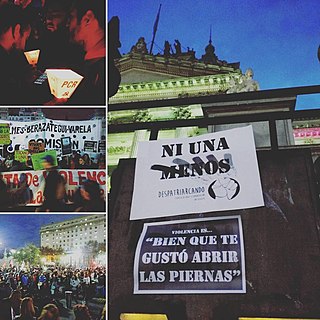
Ni una menos is a Latin American fourth-wave grassroots feminist movement,which started in Argentina and has spread across several Latin American countries,that campaigns against gender-based violence. This mass mobilization comes as a response to various systemic issues that proliferate violence against women. In its official website,Ni una menos defines itself as a "collective scream against machista violence." The campaign was started by a collective of Argentine female artists,journalists and academics,and has grown into "a continental alliance of feminist forces". Social media was an essential factor in the propagation of the Ni Una Menos movement to other countries and regions. The movement regularly holds protests against femicides,but has also touched on topics such as gender roles,sexual harassment,gender pay gap,sexual objectification,legality of abortion,sex workers' rights and transgender rights.

#NiUnaMenos is a Peruvian group against femicides and violence against women in the Andean country. The movement was formed in July 2016,and the march it staged in August 2016 has been characterized as the largest demonstration in Peruvian history
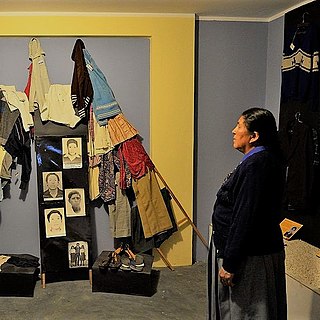
Angélica Mendoza de Ascarza was a Peruvian Quechua human rights activist. She is considered to be a symbol of human rights in Peru and of those who disappeared in the country from 1980 to 2000 as a result of the internal violence in Peru and has been recognized by the International Red Cross and Amnesty International as a "tireless advocate for those women who lost their loved ones."

Femicides in Peru are murders committed against women in Peru,a country in South America,which experiences high levels of violence against women. Between 2010 and 2017,837 women were murdered and 1,172 murder attempts were made. Updated numbers between 2015 and 2021 showed and increase in femicides,with 897 women being killed in Peru during the period.
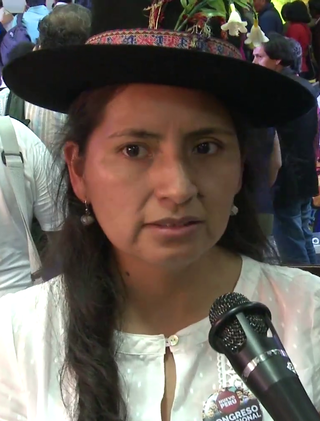
Tania Pariona Tarqui is a Quechua leader,social worker,politician and human rights activist who represented the Department of Ayacucho in the Congress of the Republic of Peru. As an activist,she works largely to establish social equality for the Indigenous,youth and women. In 2016,she was elected to the Peruvian Congress by the Broad Front for Justice,Life and Freedom. In September 2017,she joined the New Peru bloc. On 15 August 2018,she became president of the Women and Family Commission of the Congress.

The Inca Garcilaso de la Vega University (UIGV) is a private university located in the city of Lima,Peru. Founded on December 21,1964,during the first government of President Fernando Belaúnde Terry. It is currently in the period of cessation of activities due to the fact that the Superintendencia Nacional de Educación Superior Universitaria (Sunedu) denied his licensing.
Elidio Espinoza was a Peruvian politician and colonel,who served on the force of the National Police of Peru.

Luis Alberto Otárola Peñaranda is a Peruvian attorney and politician who currently serves as Prime Minister of Peru. He previously served as Minister of Defense twice,under Ollanta Humala and Dina Boluarte.

Dina Ercilia Boluarte Zegarra is a Peruvian politician,civil servant,and lawyer currently serving as the President of Peru since 7 December 2022. She had served as the first vice president and minister at the Ministry of Development and Social Inclusion under President Pedro Castillo. Before then,she served as an officer at the National Registry of Identification and Civil Status (RENIEC) from 2007 until 2022. With Boluarte assuming the presidency as the sole vice president,President of Congress Alejandro Soto Reyes is next in the line of succession.

The Sinchis,also known as the Sinchis de Mazamari after their training location,are a paratrooping unit of the National Police of Peru specialized in counterinsurgency and anti-narcotics operations.

"Canción sin miedo" is a song of the regional Mexican genre by Mexican composer Vivir Quintana that speaks about the violence experienced by women,it has become an anthem in feminist protests.

Following the ousting of president of Peru,Pedro Castillo on 7 December 2022,a series of political protests against the government of president Dina Boluarte and the Congress of Peru occurred. The demonstrations lack centralized leadership and originated primarily among grassroots movements and social organizations on the left to far-left,as well as indigenous communities,who feel politically disenfranchised. Castillo was removed from office and arrested after announcing the dissolution of Congress,the intervention of the state apparatus,and the establishment of an "emergency government",which was characterized as a self-coup attempt by some media organizations and institutions in Peru while Castillo's supporters said that Congress attempted to overthrow Castillo. Castillo's successor Dina Boluarte,along with Congress,were widely disapproved,with the two receiving the lowest approval ratings among public offices in the Americas. Among the main demands of the demonstrators are the dissolution of Congress,the resignation of Boluarte,new general elections,the release of Castillo,and the formation of a constituent assembly to draft a new constitution. It has also been reported that some of the protesters have declared an insurgency. Analysts,businesses,and voters said that immediate elections are necessary to prevent future unrest,although many establishment political parties have little public support.

The Ayacucho massacre was a massacre perpetrated by the Peruvian Army on 15 December 2022 in Ayacucho,Peru during the 2022–2023 Peruvian protests,occurring one day after President Dina Boluarte granted the Peruvian Armed Forces expanded powers and the ability to respond to demonstrations. On that day,demonstrations took place in Ayacucho and the situation intensified when the military deployed helicopters to fire at protesters,who later tried to take over the city's airport,which was defended by the Peruvian Army and the National Police of Peru. Troops responded by firing live ammunition at protesters,resulting in ten dead and 61 injured;Among the injured,90% had gunshot wounds,while those killed were shot in the head or torso. Nine of the ten killed had wounds consistent with the ammunition used in the IMI Galil service rifle used by the army.


















